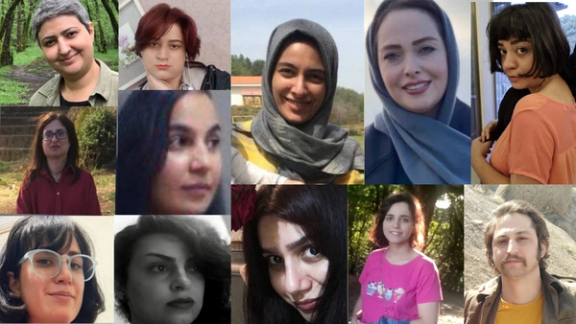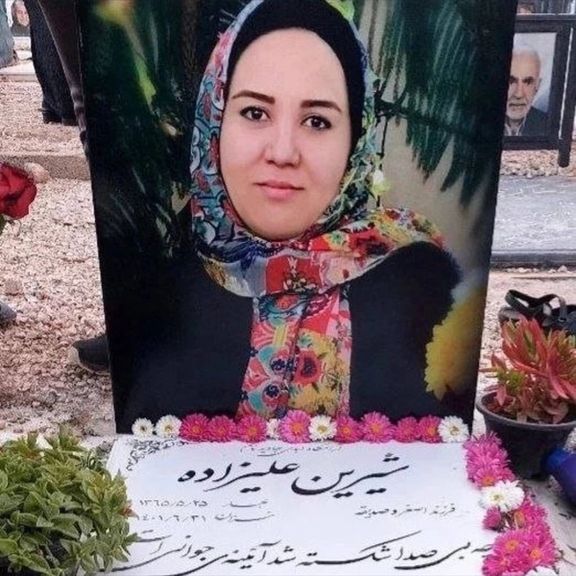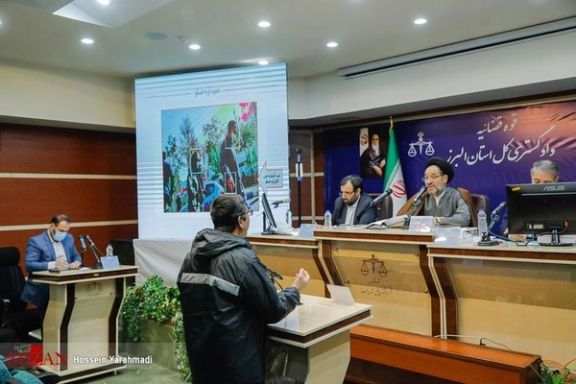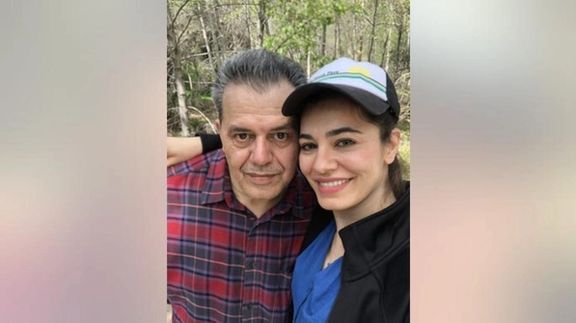International Support For Release Of Detained Iranian Activists

A group of prominent French figures have signed a letter addressed to the Iranian Embassy in Paris calling for the release of 12 activists in Iran.

A group of prominent French figures have signed a letter addressed to the Iranian Embassy in Paris calling for the release of 12 activists in Iran.
The letter, from more than a hundred prominent French personalities, draws attention to “illegally detained feminist activists” and more broadly to all prisoners who champion human rights in Iran.
The signatories include Laurence Rossignol, vice-president of the Senate of the French Republic, Olivier Faure, first secretary of the Socialist Party, Sandrine Rousseau, ecologist deputy Nupes and Dominique Voynet, doctor and former minister. Collectively, the group deplores the arrest on August 16 and 17 of a dozen of Iranian women's rights and civil activists in the northern province of Gilan.
The letter, titled "Justice for Iran," was addressed to the Chargé d'Affaires of the Iranian embassy. Central to their plea is the fundamental principle of freedom of expression, as enshrined in international agreements, including the International Covenant on Civil and Political Rights, of which Iran is a signatory.
One week after their arrest, the prisoners remain incarcerated, despite efforts from their families, who are demanding temporary release.
The recent intensified crackdown against human rights activists across Iran coincides with the September anniversary of Mahsa Amini's death in police custody.

Amid an intense intimidation ahead of the anniversary of Women, Life, Freedom protests, the Iranian regime has arrested several more relatives of government victims.
The regime’s efforts to discourage potential resurgence of street protests have continued in the past few days with detentions of family members of Shirin Alizadeh, Mohammad Javad Zahedi, and Esmail Barahouei, who were killed by government forces, as well as Mohammad-Mehdi Karami, who was executed on trumped up charges.
Mashallah Karami, the father of Mohammad-Mehdi, was arrested Tuesday after security agents stormed the family’s home and took electronic devices such as laptops and mobile phones with them.
Mashallah Karami's arrest has triggered widespread reactions, with many Iranians describing it as proof of the regime’s fear of potential unrest on the anniversary of the uprising.
On Wednesday, regime agents raided Nasrin Alizadeh's home, detained her, and transferred her to an undisclosed location. Last week, security forces arrested Kourosh Vaziri, whose 35-year-old wife Shirin Alizadeh was killed by regime agents while she was filming protests alongside her husband and child in Mazandaran province last September. The moment she was shot and killed was captured and recorded on his mobile phone.

On Wednesday evening, Mahsa Yazdani, the mother of Mohammad Javad Zahedi, was also arrested. Mohammad Javad Zahedi, a 20-year-old from Sari, was wounded by security forces on the night of September 22 and died due to bleeding as emergency services failed to treat him.
Another arrestee was Faramarz Barahouei, the 15-year-old brother of Esmail Barahouei (Abil), who was among those killed on the Bloody Friday in Zahedan. The teenager was arrested by the military in Torbat-e Heydarieh, a city in Khorasan Razavi province 800 kilometers north of Zahedan, where his brother was killed. The crackdown on protesters in Zahedan, the provincial capital of Sistan-Baluchestan, known as the Bloody Friday, took place on September 30,2022, when security forces killed more than 80 people, including women and children.
The regime has escalated its clampdowns on activists, students, educators, and writers in the lead-up to the September 16 anniversary of Mahsa Amini’s death at the hands of police. Families of protesters who died during the uprising as well as civil and human rights activists and students are the main target of the regime’s repression apparatus that wants to silence the most prominent popular voices.
Decrying Iran's campaign of harassment and intimidation, Amnesty International said earlier in the week that the families of those unlawfully killed by Iran’s security forces during the 2022 uprising must be allowed to mark the one-year anniversaries of their deaths. The group also published a new research detailing how the Iranian authorities have been subjecting victims’ families to arbitrary arrest and detention, imposing cruel restrictions on peaceful gatherings at grave sites, and destroying victims’ gravestones. Amnesty International also documented and published images depicting the destruction of graves belonging to more than 20 victims from 17 cities.
Victims’ families have faced reprisals for publicly condemning or lodging official complaints about the unlawful killings of their loved ones by security forces, challenging official narratives about their deaths, calling for accountability, holding gatherings for bereaved families, and writing social media posts deemed critical of the authorities, Amnesty added.
Alan Tofighi, a Paris-based physician and activist, told Iran International that the recent arrests and harassments underscore the regime's apprehension regarding potential renewed protests, to the extent that it even fears the memory of protesters buried in graves. Earlier this week, authorities announced that the family of Mahsa Amini cannot set up a pop-up canopy over her grave, citing the possibility of gatherings as the reason.
Dozens of the victims’ families and protesters who were detained and released during the nationwide rallies in the past year have been arrested or summoned, with reports coming from several provinces, including Tehran, Gilan, Kordestan, West Azarbaijan, and Esfahan (Isfahan).
Those summoned by the intelligence agencies have been asked to sign pledges to stay at home for a week, and some have even been required to take time off from work, ensuring their absence from any protests. They have been threatened with arrest if they are found engaged in any pro-protest movement activities in public or on social media.
So far, seven protesters have been executed, and several others face execution. Hardliner cleric and member of the Iranian Assembly of Experts Ahmad Khatami also issued a stern threat against any future protesters, saying that they would be met with forceful suppression, as if the current rounds of suppression are not forceful.

Iran's Supreme Court has upheld verdicts for detained protesters linked to the death of Basij member Rouhollah Ajamian, except for minor protester Arian Farzamnia.
Alborz Province Chief Justice Hossein Fazeli Harkandi confirmed, "The country's Supreme Court has finalized the verdicts for detained protesters tied to Rouhollah Ajamian's death, excluding Arian Farzamnia."
The sentences include harsh penalties. Hamid Qarahasanlou received a 15-year prison term in exile, wich would mean incarceration in a remote region. Reza Aria, Hossein Mohammadi, and Mehdi Mohammadi each got 10 years in prison.
Others involved faced sentences. "Mohammad Amin Akhlaghi Savojbolaghi, Amin Mehdi Shokrollahi, and Farzaneh Qarahasanlou were sentenced to five years in prison in exile. Ali Mozaffari Goodarzi got three years in prison," Chief Fazeli Harkandi stated.
For Arian Farzamnia, under 18, Fazeli Harkandi noted the verdict's medical forensic evaluation by the Supreme Court. A new verdict by the Revolutionary Court of Alborz Province will follow.
This development follows ongoing fairness and transparency concerns in the Ajamian case. Fourteen protestors received up to 15-year sentences, criticized by human rights advocates.
Ajjamian died near Tehran in November, allegedly by a group termed "rioters" by the regime. The Basij militia member suffered fatal assault and humiliation.
Executions of Mohammad Mehdi Karami and Mohammad Hossein in connection with Ajamian's death raised due process concerns. Swift trials without representation were involved.
These events spotlight wider protests across Iran, demanding justice and ending oppressive policies. The regime's harsh response and heavy sentences reflect determination to quell dissent and resist change.

The daughter of German-Iranian Jamshid Sharmahd, who is currently on death row in Iran, pleaded for the United States and Germany to intervene in his case.
Following a sit-in protest outside the US State Department, Gazelle Sharmahd, who lives in California, issued her urgent appeal to officials in Washington. "What I'm asking the US and Germany is to free my father, to bring my father back, to save his life," she said.
This appeal comes in the wake of a recent deal by President Joe Biden's administration, which secured the release of five American citizens incarcerated in Iran.
Sharmahd, 68, a software developer and long-term resident of California, was reportedly abducted during a visit to the United Arab Emirates in 2020 and subsequently transported to Iran against his will. The Iranian judiciary sentenced him to death on charges of "spreading corruption on Earth," a verdict that was upheld by Iran's Supreme Court in April. The family has vehemently rebuffed the allegations and Amnesty International has already condemned his trial as a sham.
Gazelle Sharmahd said she was frustrated by the passing of responsibility between Germany and the US. "It seems like a game of responsibility ping-pong. The issue is tossed back and forth, with each side claiming 'not my citizen,' 'not my jurisdiction.' And we're not getting through to them," she said
Germany has said it is actively involved in the case through its highest channels but Gazelle Sharmahd is convinced that Germany's efforts were only on improving her father's prison conditions.
While denouncing Iran's treatment of Sharmahd as "reprehensible," the US State Department said that that the case falls within Germany's purview as he is their citizen.

An understanding with Iran to eventually release five Americans remains on track, White House National Security Adviser Jake Sullivan said Tuesday but declined to offer any timeline.
Iran on August 10 released four imprisoned US citizens into house arrest, where they joined a fifth already under home confinement, in the first step of a deal under which $6 billion in Iranian funds in South Korea would be unfrozen and the five would eventually be allowed to leave.
"We believe that things are proceeding according to the understanding that we've reached with Iran. I don't have an exact timetable for you because there's steps that need to yet unfold. But we believe that that remains on track," Sullivan told reporters in a conference call.
South Korean media reported Monday the money has already been transferred to the Swiss central bank that would convert the funds to euros and send it to Iranian bank accounts in Qatar. Iran’s foreign ministry said Monday that it would take two months for the hostages to be allowed to leave.
Allowing the five to leave Iran, which could take weeks, would remove a major irritant between Washington and Tehran, which remain at odds on issues from the Iranian nuclear program to Tehran's support for regional Shi'ite militias.
The Iranian Americans who were allowed to leave Iran's Evin prison included businessmen Siamak Namazi, 51, and Emad Shargi, 58, as well as environmentalist Morad Tahbaz, 67, who also has British nationality. The identity of the fourth US citizen who left the prison has not been made public, nor has that of the fifth who was already under house arrest.

Iran’s exiled Prince Reza Pahlavi has made a public appeal to his compatriots encouraging global support for political prisoners in Iran.
Speaking in front of the US State Department, alongside Darin Dalili and Ghazaleh Sharmahd, children of Shabab Dalili and Jamshid Sharmahd, dual-national prisoners in Iran, Prince Pahlavi said that Iranians, regardless of their global location, remain unwavering in solidarity for their fellow citizens, both within and outside the country.
"We will not remain silent and indifferent to decisions or policies that continue such practices,” he said.
Extending further support to all political prisoners Prince Pahlavi appealed to people worldwide to urge governments not to yield to extortion in exchange for the release of captives. He also criticized the practice of unfair hostage negotiation, stating that the value of all human life is equal. This comment comes after Dalili and Sharmahd were left out of a hostage release deal between Iran and the United States, where over $6 billion blocked funds were released in exchange for American detainees.
Dalili, a former captain of Iran Shipping Company and a US resident, was arrested during a trip to Tehran in 2016 for his father's funeral, after which he was apprehended by security forces.
Jamshid Sharmahd, 67, a former resident of the United States, was abducted by Iranian authorities during a trip from Germany to India in August 2020 during a three-day layover in Dubai.
In addition to suppressing dissidents and detaining political activists and journalists abroad, the Islamic Republic has regularly detained foreign or dual-national citizens as hostages to leverage demands against Western nations.






